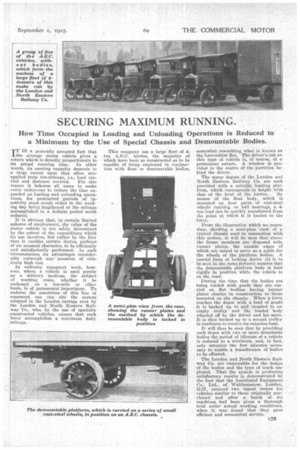SECURING MAXIMUM RUNNING.
Page 13

If you've noticed an error in this article please click here to report it so we can fix it.
How Time Occupied in Loading and Unloading Operations is Reduced to a Minimum by the Use of Special Chassis and Demountable Bodies.
IT IS a generally accepted fact that the average motor vehicle gives a return which is directly proportionate to its actual running time. In other wards, its earning capacity depends to n large extent upon that often misapplied term ton-mileage, i.e., load car ried and distance covered. For this reason it behaves all users to make every endeavour to reduce the time ex, llended on loading and unloading operations, for protracted periods of inactivity must result either in the worRing day being lengthened or the mileage accomplished in a definite period much reduced.
It is obvious that, in certain limited spheres of einployment, the value of the motor vehicle is not solely determined by the extent of the expenditure which its use involves, but rather by the fact that it enables certain duties, perhaps of an unusual character, to be efficiently and satisfactorily performed. in such °circumstances its advantages considerably outweigh any question of relatively high cost.
In ordinary transport work, however, where a vehicle is used purely as a delivery medium, the subject cf working costs, whether it be reckoned. on a ton-mile or other basis, is of paramount importance. To endorse the assertions of this line of argument one can cite the system. adopted in the London cartage area by the London and North Eastern Railway Co., who, by the use of specially constructed vehicles, ensure that each lorry accomplishes a 'maximum daily mileage.
This company use a large fleet of 4ton A.E.C. lorries, the majority of which have been so constructed as to be capable of being employed in conjunction with float or demountable bodies. somewhat resembling what is known as the Lancashire flat. The driver's cab on this type of vehicle is, of course, of a permanent nature. A window is provided in the centre of the partition behind the driver.
The many depots of the London and North Eastern Railway Co. are each provided with a suitable loading platform, which corresponds in height with that of the level of the lorries. By means of the float body, which is mounted on four pairs of cast-steel. wheels running on ball bearings, a 4ton load can be quickly transferred from the point at which it is loaded to the lorry.
From the illustration which we reproduce, showing a semi-plan view of a typical chassis used in connection with this system, it will be seen that above the frame members are disposed wide runner plates' the outside edges of which are raised to serve as a guide for the wheels of the platform bodies. A special form of locking device .(it is to be seen in the same picture) ensures that the demountable platform body is held rigidly in position while the vehicle is on the road.
During the time that the bodies are being loaded with goods they are carried on flat trollies having runner plates similar in construction to those mounted on the chassis. When a lorry reaches the depot with a load of goods it is backed up to and coupled to an empty trolley and the loaded body wheeled off by the driver and his mate. It is then backed up to a second trolley in readiness to receive its outgoing load.
It will thus be seen that by providing each depot with two or more detachable bodies the period of idleness of a vehicle is reduced to a minimum, and, in fact, only occupies the few minutes necessary to enable a transference of bodies
to be effected.
The London and North Eastern Railway Co. are responsible for the design of the bodies and the type of track employed. That the system is producing satisfactory results is demonstrated by the fact that the Associated Equipment Co., Ltd., of Walthamstow, London, E.17, received two repeat orders for vehicles similar to those originally purchased and after a batch of six machines had been given a thorough trial nude,. actual working conditions, when it was found that they gave efficient and economical service.




























